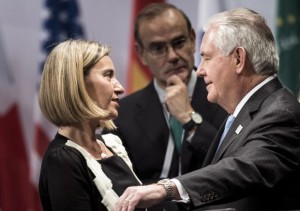Old alliances in doubt as world’s top diplomats meet in Bonn

EU’s High Representative Federica Mogherini (left) and US Secretary of State Rex Tillerson talk before the opening session meeting of the G20 foreign ministers at the World Conference Center in Bonn, Germany, Thursday, Feb. 16, 2017. Foreign ministers from 20 of the world’s leading nations met Thursday in the former German capital to discuss current conflicts and ways to prevent future crises against a backdrop of uncertainty among allies and adversaries about the direction of US foreign policy. (Pool photo by BRENDAN SMIALOWSKI/AP)
BONN, Germany — Envoys from 20 of the world’s leading nations met Thursday in Germany to discuss current conflicts and ways to prevent future crises, against a backdrop of uncertainty among allies and adversaries over the direction of US foreign policy.
Germany’s foreign minister Sigmar Gabriel, who is hosting the two-day talks in the western city of Bonn, emphasized ahead of the meeting that international cooperation was the only way to tackle the big global problems.
European countries have expressed concern that their longstanding trans-Atlantic ties may suffer if the United States pursues an isolationist policy, and Gabriel rebuffed President Donald Trump’s stated goal of putting “America first.”
“Security in the world can’t be achieved without justice and a better life for everybody,” Gabriel told reporters.
Gabriel suggested Trump’s election should be a wake-up call for the European Union, saying in a newspaper interview that the 28-nation bloc needs reform if it wants to be taken seriously by global powers such as the United States, Russia and China.
Article continues after this advertisement“We have believed for too long that our way of living is best defended by the Americans,” Gabriel was quoted as telling German daily Frankfurter Allgemeine Zeitung in an interview published Thursday.
Article continues after this advertisementGabriel expressed hope that the absence of American support, on which the European Union has relied on for decades, may spur much-needed reform of the bloc and help address growing skepticism about the EU that has resulted in a revival of nationalist politics on the continent in recent years.
“Pressure from outside can be quite beneficial,” he told the paper.
Officially, talks among the Group of 20 leading industrialized and emerging economies will focus on the 17 so-called sustainable development goals that the international community agreed to aim for by 2030. Recognizing and preventing future crises, as well as support for Africa, are also on the agenda.
But a flurry of bilateral meetings preceded the summit’s official start mid-afternoon.
For many foreign ministers it was the first opportunity to talk face-to-face with recently confirmed US Secretary of State Rex Tillerson, who had meetings with his counterparts from Saudi Arabia, Britain and Russia.
Gabriel, meanwhile, indicated that Germany is keen to improve its sometimes tense relations with Russia and China.
Speaking after face-to-face talks with his Chinese counterpart Wang Yi, he said Berlin and Beijing planned to strengthen not just their already close trade ties but also foster cooperation in education and civil society.
On Russia, he reiterated Germany’s call for Moscow to lean on pro-Russia separatists in eastern Ukraine to pull back their heavy weapons from the front line. After meeting Lavrov, Gabriel said foreign ministers from Russia, Ukraine, France and Germany would discuss how to bring lasting peace to eastern Ukraine at the Munich Security Conference on Saturday.
Tillerson and Gabriel were scheduled to meet later Thursday, after a banquet dinner that diplomats said was expected to see a “frank and open” discussion about current crises in the world.
Outside the venue, campaigners from the environmental group Greenpeace unfurled banners with the words “Planet Earth First” from a boat on the Rhine River and a nearby high-rise to protest against climate change. –Frank Jordans